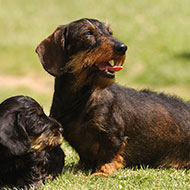
BVA says win could fuel growth in demand for the breed
Vets have expressed concern after a wire-haired dachshund scooped first place at Crufts, the UK’s biggest dog show, on Sunday (8 March).
The British Veterinary Association (BVA) believes the win could fuel interest in the breed, with many prospective owners not realising the potential health problems dachshunds can suffer from.
The organisation is now calling on anyone thinking about getting a dachshund to consider the spinal issues associated with long, low body types and to contact their vet for tailored advice.
BVA president Daniella Dos Santos said: “We’re concerned that seeing a dachshund crowned top dog at Crufts could lead to a further rise in their popularity and related increase in the health issues that can, unfortunately, affect these and other long and low breeds.
“Vets of course love and care for all dogs, but success in the show ring may lead to a further boom in demand outside of it from owners who may not be aware of these health issues and the extra care and treatment they may require as a result.”
One of the most common issues seen in dachshunds is intervertebral disc disease (IVDD). Research show that the risk of IVDD in dachshunds is 10-12 times higher than other dog breeds, with at least one-fifth of all dachshunds showing clinical signs in their life.
The BVA says these health issues are a specific concern, as recent figures show that dachshunds are fast becoming the UK’s most fashionable breed. Thanks to social media, advertising and celebrity appeal, registrations for the miniature smooth haired dachshund have risen almost 200 per cent in the past decade.
Ms Dos Santos continued: “The message from vets is loud and clear- always pick health over looks or Insta-appeal. Before adding a dog to their family, we encourage anyone thinking of getting one to seek information and advice from their local vet on the right breed for them."



 The Veterinary Medicines Directorate (VMD) is inviting applications from veterinary students to attend a one-week extramural studies (EMS) placement in July 2026.
The Veterinary Medicines Directorate (VMD) is inviting applications from veterinary students to attend a one-week extramural studies (EMS) placement in July 2026.